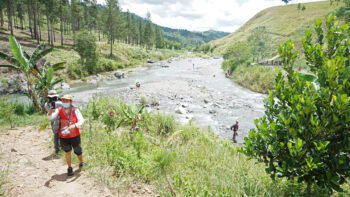ZAMBOANGA CITY (MindaNews/18 April) — It was four years ago when I first saw AlBarka in Basilan as a relatively peaceful place–still not fully developed, but youth in its village capital, Magcawa, and neighboring Kennuh Lennuh, were full of hope that somehow, years from now, there would be progress from the last sight I had to stomach in.
In the coastal village of Sangkahan, we waded through shallow waters as we alighted from the motorized banca (canoe) that we hired from Lamitan. We were set to visit a supposed school site to check what little contribution we could extend. But this overwhelming experience made me think that some day, I should return, not as a journalist in search of a story, but as a person just trying to do a little something for humanity. I sought help that time, but the military told an NGO (I sought help from) that all efforts go through them.
Why AlBarka, anyway? It was the site of a military encounter in 2007 that swept away lives of soldiers who were but pawned by a politicized Philippine military system, and Al-Barkans trapped in a militarized training ground.
In 2015, under the Australia Aid-Basic Education Assistance for Mindanao (AusAID-BEAM) Project, 450 out-of-school youth were provided with technical-vocational skills trainings. I managed the program operation that was implemented then by Zamboanga City-based Mein, Incorporated, giving me the opportunity to visit communities and the training sites, particularly Lamitan Technical Institute in Lamitan City, and community halls. One of these towns is Al-Barka, and I was happy to meet the Yakans of the place and hear them share their stories.
But implementing a training program in Al-Barka brought a bagful of surprises. Youth there were thirsty for education and learning opportunities: to be wearing their best clothes, to be traveling to Lamitan regularly without fear for their safety, to be proudly claiming that they were going to school, and wearing the AusAid-BEAM-DepEd-Basilan-Mein uniforms.
Together with Children of War-Basilan, the Lamitan Jaycees, Voice of Mindanao, and others, I revisited Al-Barka, with the full force security assistance of the 18th IB, then under LtC Tiny Perez, himself a Basileño. Others provided medical services and stuff for the kids, VoM brought water and food for the youth there. VoM tagged along the 545ECB Band to perform songs for the people of Al-Barka. It was the first concert that entered the town. Mein enabled the tech voc skills trainees to bake more cookies and bread for the hungry children. It was an overwhelming experience to be part of a joint effort to do something for a community.
I went back in the final quarter last year, and saw those once-OSY transformed. They were confident of themselves, they were vocal on issues, they spoke with visions. And they secured jobs outside of Al-Barka. The most heart-tugging remark was, “At least, ma’am, hindi na kami tiningnan na Abu Sayyaf (we are not anymore looked at as Abu Sayyaf).” The context was a pre-program orientation when their common sentiment why they could not get work outside of their town was, when employers see or know of their birthplace, they are immediately tagged as ASG members or supporters.
Apparently, it was a stigma they lived with, but having completed that short techvoc course made a difference in their lives. (Years ago, when I was fielded to conflict-affected areas for USAID programs, I heard happy stories from those whose lives were uplifted vis-a-vis solar panels or good environmental management practices–but I realized education support bears a more lasting impact.).
Recently, as the conflict brewed at its farflung communities bordering Tipo-Tipo, I felt their frustration when they said, “Ma’am, kung ‘di namin babalikan at tutulungan ang Al-Barka, sino pa ang tutulong sa amin? (If we do not return and help Al-Barka, who else will help us?)” I thought of how they found courage. (Last year, I had personally shared with them how they could better their lives, how they could become better citizens, and how they can transform Al-Barka from a conflict area to a developing one–and these constant reminders stayed with them. Mayor Darus Majid then similarly urged them to think ahead because one day, one of them is likely to fill his shoes.)
In the few times I have gone there, I have seen poverty in parts of nature-rich Al-Barka like no other, but I have seen hope too.







